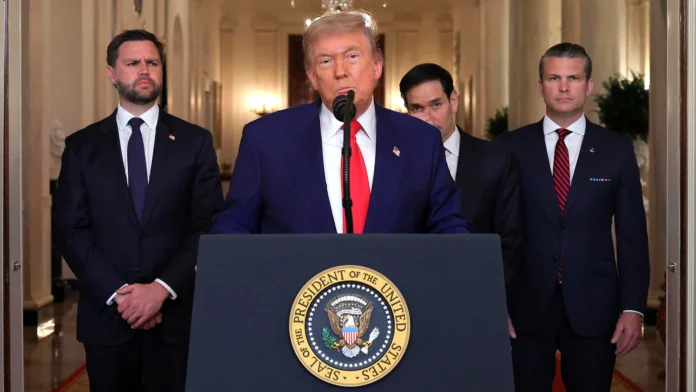US strikes on Iran’s nuclear facilities have dramatically intensified tensions in the Middle East. President Donald Trump confirmed the attacks, claiming the targets were “obliterated.” Meanwhile, Iran denies suffering major damage, setting the stage for potential retaliation.
The strikes hit three key nuclear sites: Fordo, Natanz, and Isfahan. Fordo, buried deep underground, is crucial for uranium enrichment. To destroy such fortified facilities, the US likely used bunker buster bombs, specifically the GBU-57 Massive Ordnance Penetrator (MOP).
Weighing 13,000kg, the MOP can penetrate 60 feet of concrete. However, experts warn Fordo’s depth may have limited the bomb’s effectiveness. Israel confirmed coordinating with the US, signaling a united front against Iran’s nuclear ambitions.
Initial reports remain unclear on the extent of the damage. Iranian officials claim they evacuated the sites beforehand, minimizing losses. Yet, Trump insists the facilities were “totally obliterated.”
The International Atomic Energy Agency (IAEA) detected no radiation leaks. However, IAEA chief Rafael Grossi called an emergency meeting, underscoring global concern. Meanwhile, Iran’s foreign minister vowed consequences, leaving the world guessing about Tehran’s next move.
Iran faces tough choices. First, it could avoid further conflict, preserving its resources. Second, it might launch immediate missile strikes on US bases or Israeli cities. Third, it could delay retaliation, striking when least expected.
Hours after the US attack, Iran fired missiles at Tel Aviv and Haifa, injuring at least 16. This suggests Tehran may already be escalating. If Iran targets US allies, the conflict could engulf the entire region.
UK Prime Minister Keir Starmer backed the strikes, calling Iran’s nuclear program a “grave threat.” Conversely, UN Secretary-General António Guterres condemned the escalation. Saudi Arabia expressed “great concern,” while Oman urged de-escalation.
In the US, reactions split along party lines. Republicans like Ted Cruz praised Trump, while Democrats warned of an unauthorized war. Independent Senator Bernie Sanders called the strikes unconstitutional, reigniting debates over presidential war powers.
The conflict started when Israel bombed Iranian nuclear sites on June 13. Iran retaliated with drone and missile attacks, triggering a week-long air war. Trump, long opposed to Iran’s nuclear program, accelerated tensions by abandoning diplomacy for military action.
Despite earlier talks, Trump’s sudden strikes shocked many. Now, the world watches anxiously as Iran weighs its response. US strikes on Iran’s nuclear facilities have pushed the Middle East closer to full-scale war.
For more political updates,visit DC Brief.


